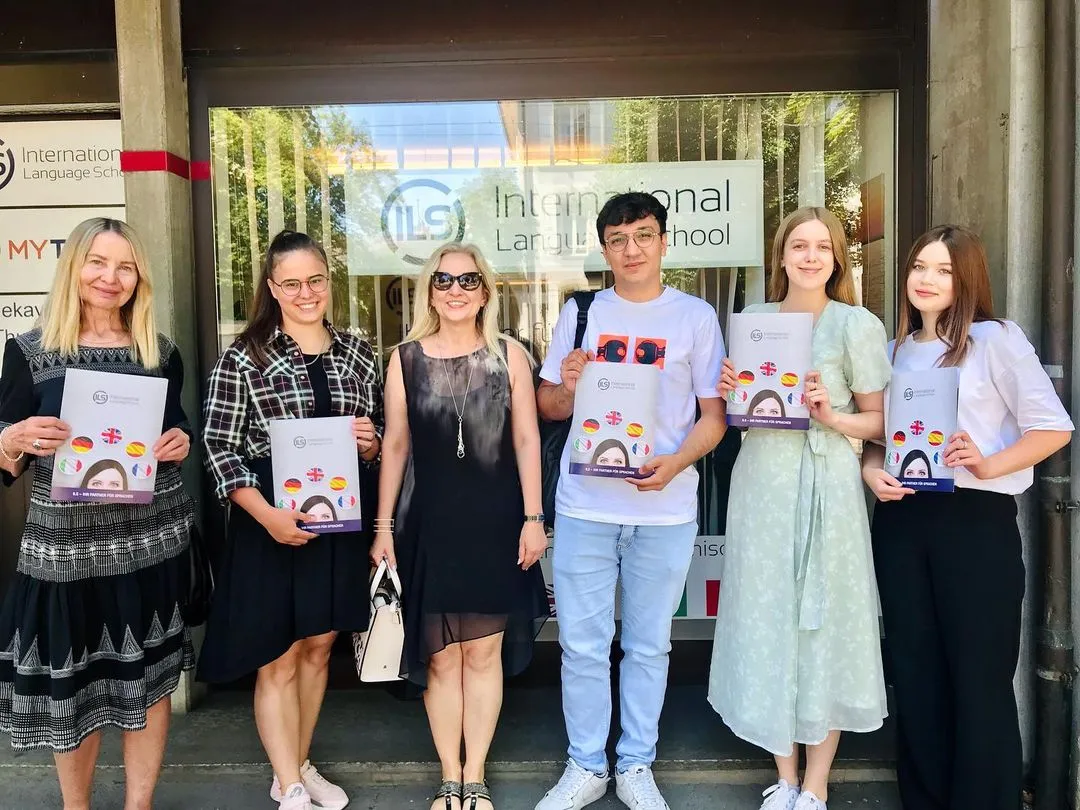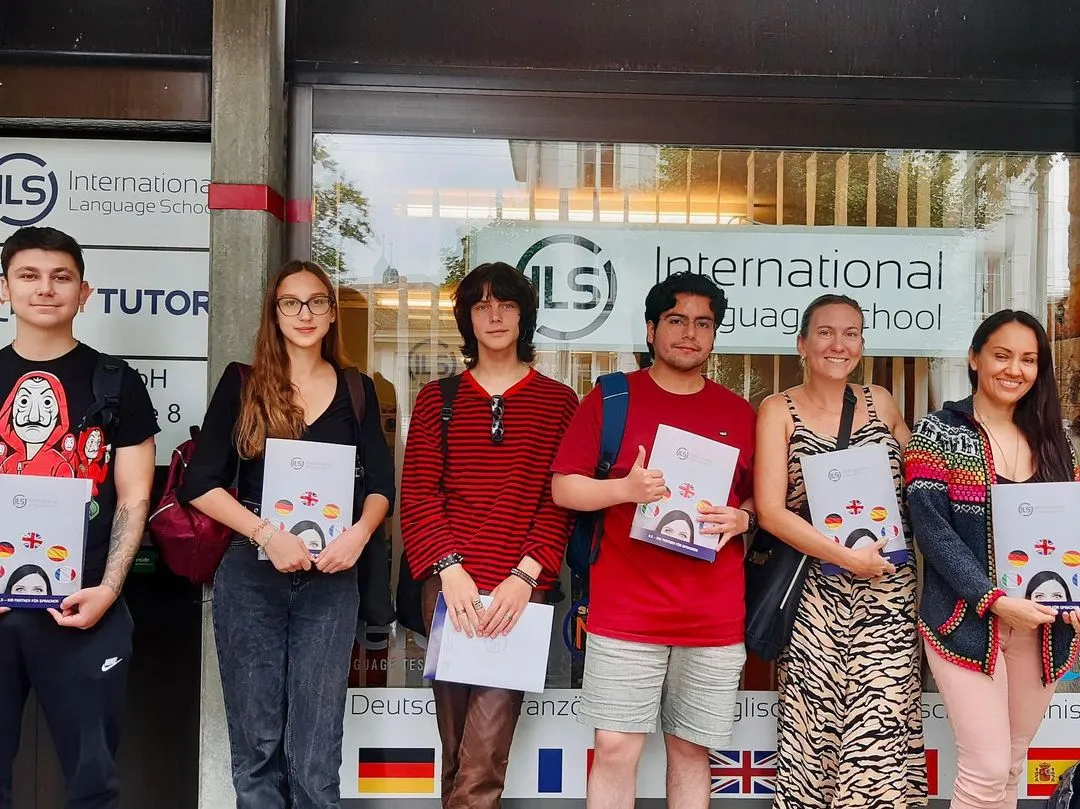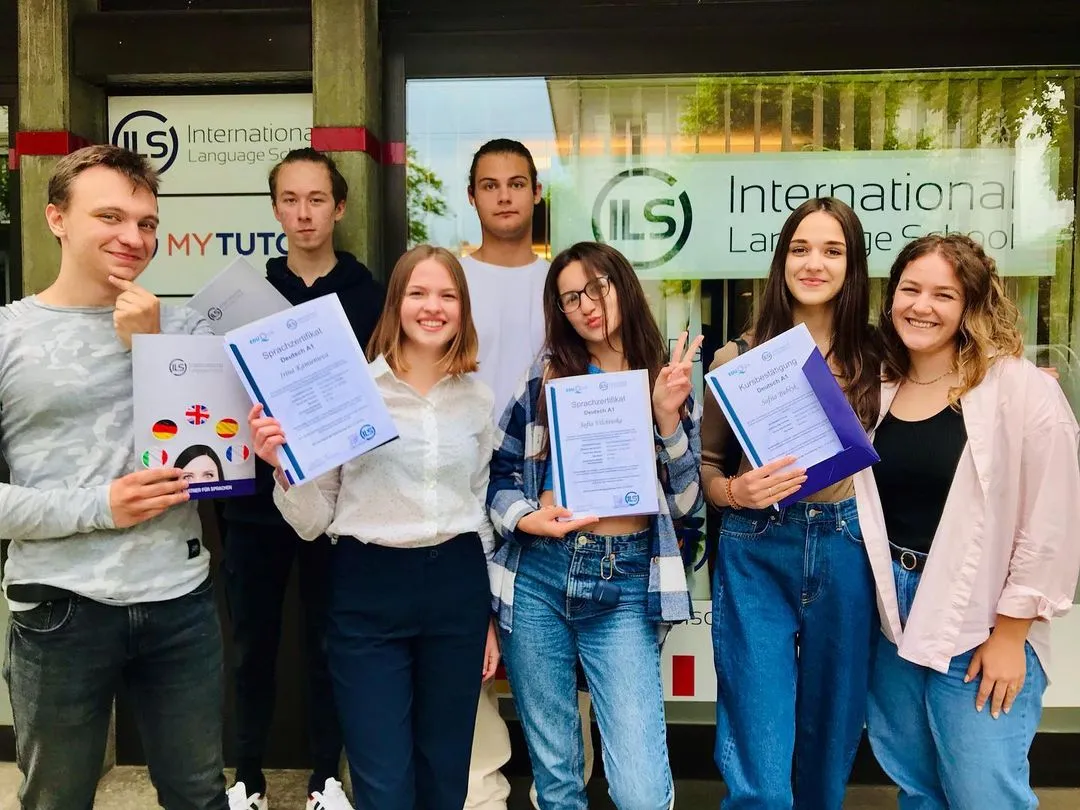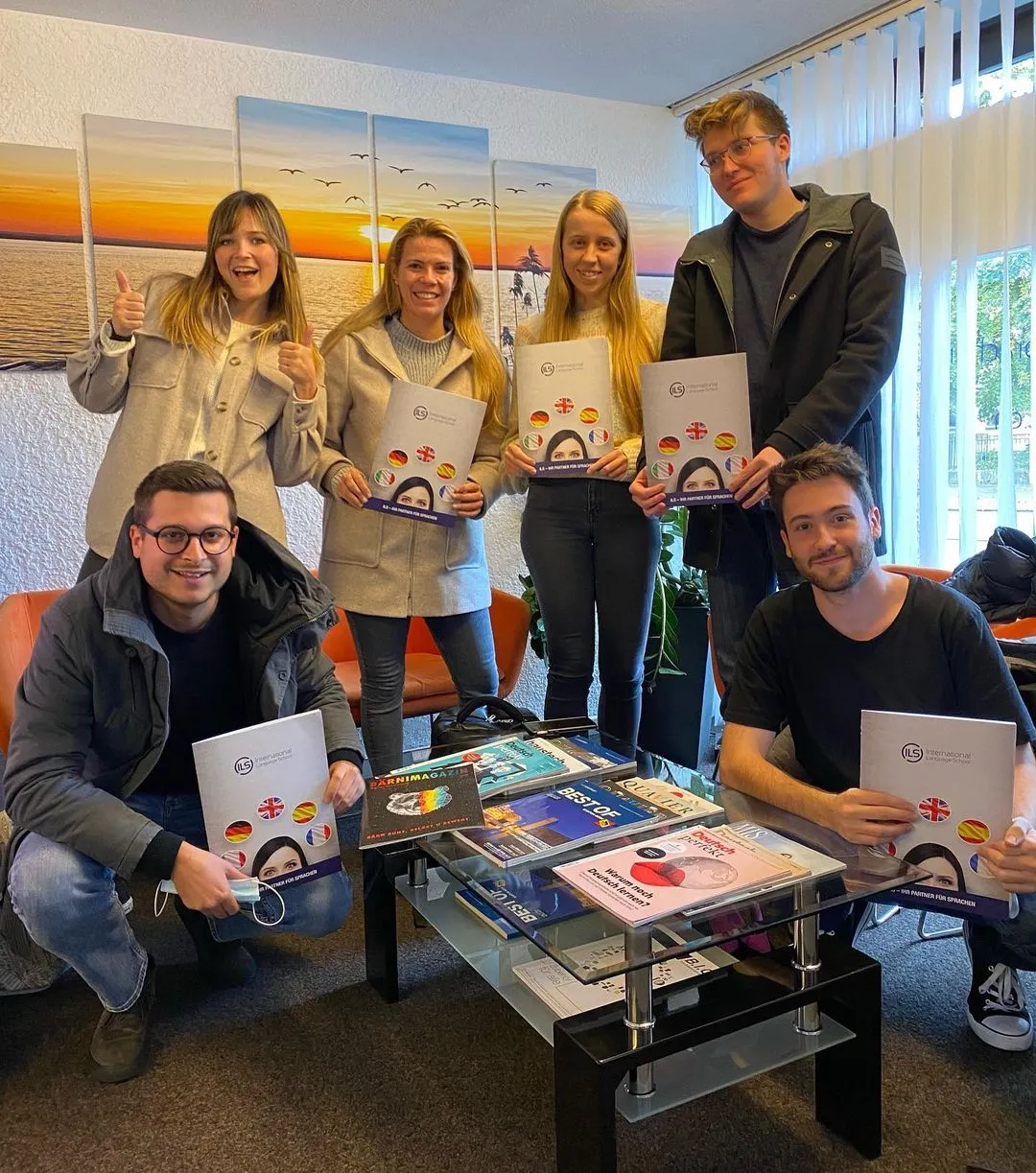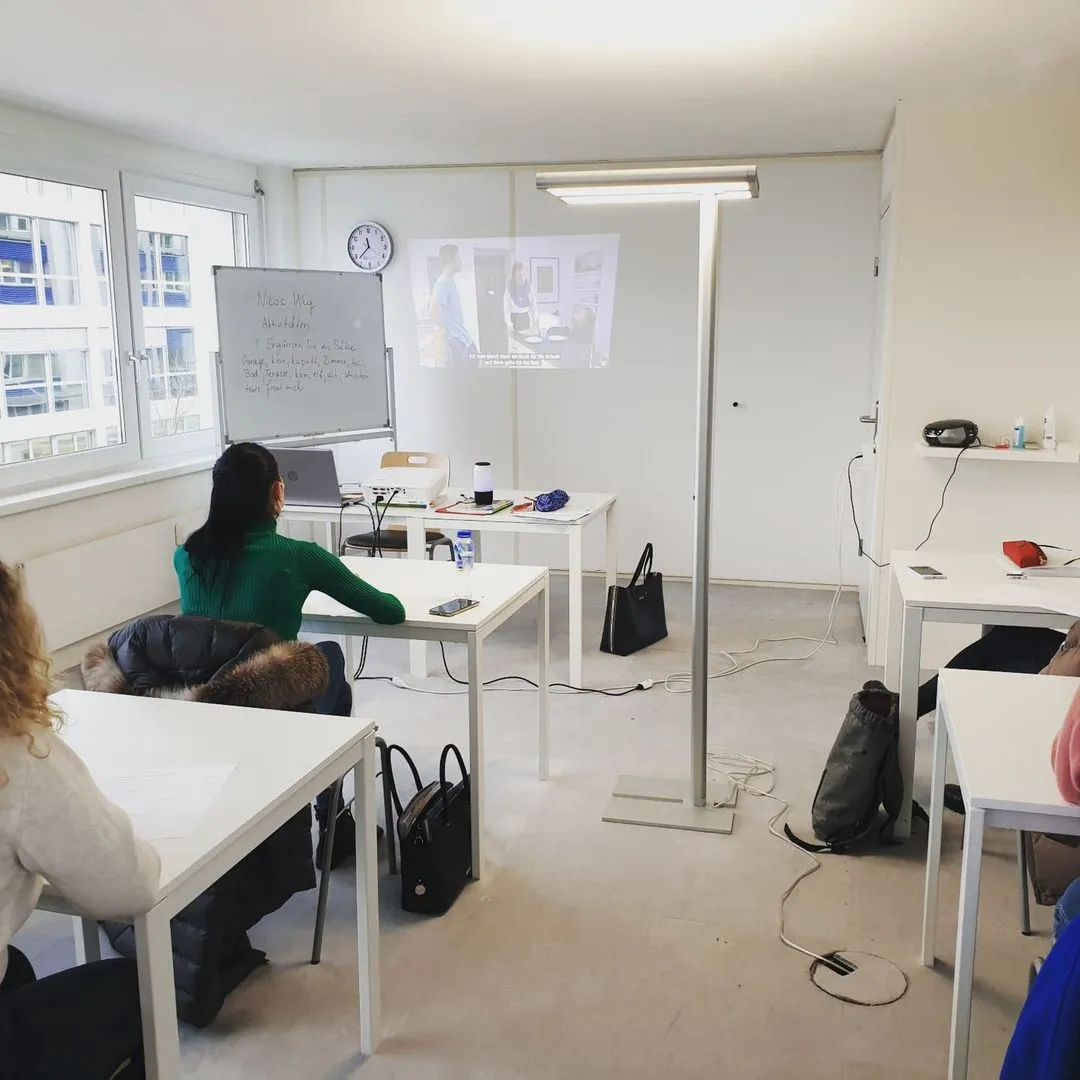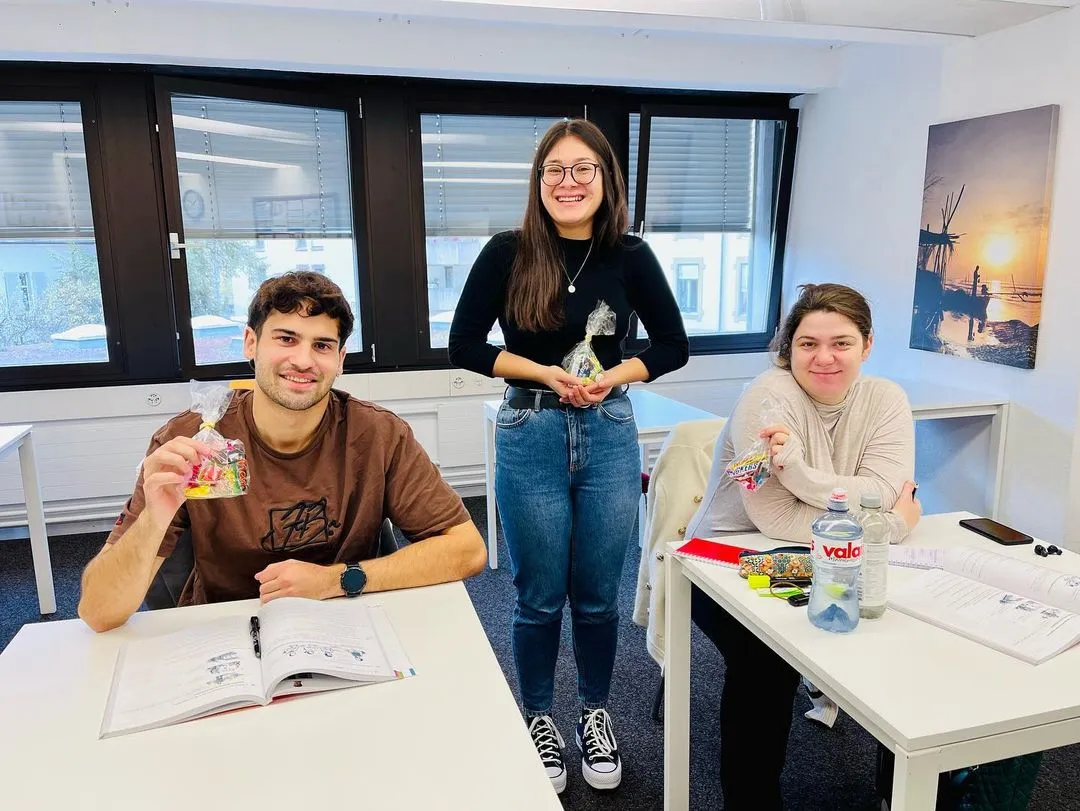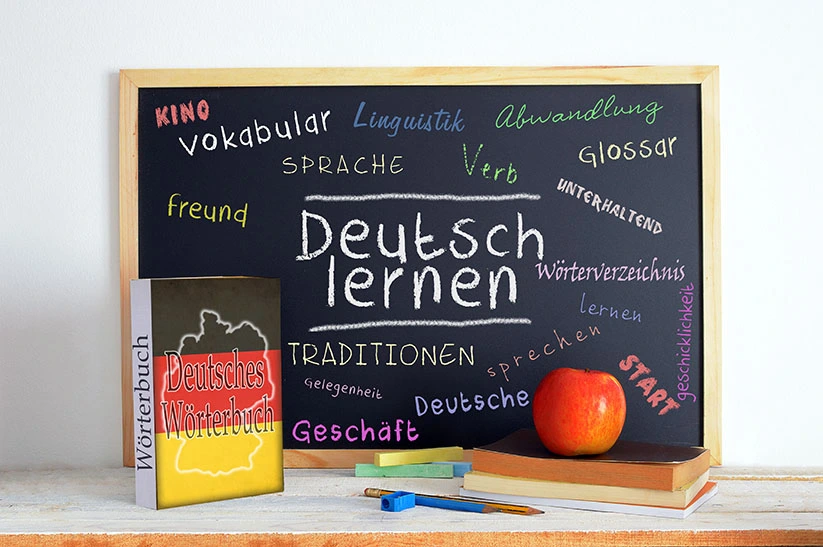
How can you learn German in Switzerland?
There are numerous opportunities to learn German in Switzerland. Professional German courses at language schools are a great option. Professional German courses also focus on basic knowledge and teach the essential content of the German language. Teachers are specially trained in teaching foreign languages and can teach participants what really matters. Difficulties and comprehension problems can be solved immediately. The course content is practiced and consolidated in active exercises, which ensures long-term learning success. In addition, the correct pronunciation and fluent speaking as well as correct argumentation are trained in the conversation part or in separate conversation courses. Another advantage of this is that professional language courses try to make learning the foreign language as easy as possible for the participants and make it fun for the students to learn German. Experience confirms that German learners who attend a language course find it easier to learn the new language, stay motivated and enjoy it more.
Language courses are usually offered in the form of group or private lessons. The advantage of private lessons is that especially for new learners, the needs and learning pace of the learner can be individually addressed. The special thing about group courses is that the course participants can enter into a dialogue with each other and thus apply what they have learned.
German can also be learned online. Many learning institutions also offer their German lessons in online courses with a teacher present. Pure online German courses are another option. These are learning programmes on an internet platform that users go through, but without a real teacher. For some people, this form of instruction is sufficient, but it is better to attend a course with a real teacher. Incomprehensions can be clarified immediately and the correct pronunciation can be trained.
Learners of German should integrate the foreign language into their everyday life as often as possible. It helps to watch films or TV programmes in German, listen to radio programmes in German or read books in German. In addition, learners of German should seek out conversations with people who already speak German as often as possible. This allows them to actively use what they have learned and to point out mistakes.
How can you learn German as quickly as possible?
Generally speaking, the more often a foreign language is used, the faster progress is made and the fewer mistakes are made. Professional German courses are a great opportunity for German learners. Regular German lessons with targeted exercises and goals help learners stay on the ball and motivated. In addition, German courses focus on the essentials and teach correct German skills, eliminating misunderstandings.
Experience has shown that learners of German who attend a professional German course make much faster progress and have correct and fluent German skills more quickly.
What language levels are there for German and what do the corresponding German courses include?
A1 Level German
A1 is the lowest level at which new learners can start. The learner mainly uses and understands short, simple, familiar words and (standard) sentences or questions: about him/herself, the family and the immediate environment. Speaking is in separate words and sentences and texts should be short. The other person must speak slowly and help. A student at level A1 knows a maximum of 1000 words. As a rule, students need 120 lessons to reach this language level.
A2 level German
A pupil understands simple sentences and frequently used words about everyday things and can talk about familiar topics in everyday situations. He or she can describe things in his or her immediate environment in simple terms. Pupils use mainly high frequency words and simple phrases, often standard sentences. The texts are short. An A2 level language user knows up to 2000 words. Students experience that it takes 120 to 180 lessons to get from A1 level to A2.
B1 Level German
A B1 level learner can understand the main points from texts, on familiar topics such as at work, school and leisure. Learners can say or write familiar matters of personal interest in a simple text. They can also describe experiences, events, dreams, hopes and ambitions, and give a reason or explanation for an opinion or plan. The vocabulary is sufficient to talk about things. The level is quite sufficient to be able to communicate fully and navigate independently when travelling abroad in the language area. Learners know about 5000 words at level B1. Learners need between 120 to 240 lessons to reach this language level starting from A2.
B2 Level German
B2 Language users can understand a longer conversation and complex arguments if the topic is reasonably familiar. It is no longer just about familiar topics such as work and education. Texts can be longer. The student can understand articles on current affairs and literary prose. The use and application of different words is not a problem if a dictionary is available. There is sufficient knowledge of the language to express own opinions on a variety of topics of interest. Students have a good command of grammar and no longer make mistakes that could hinder understanding. The transition from B1 to B2 level requires between 120 to 240 lessons.
C1 level German
The C1 language user can understand a longer conversation at this level. Even if this is not clearly structured and much is not said explicitly. He or she can understand long complex factual and literary texts. The student understands technical articles and longer technical instructions, even if not directly from or familiar with that field. They can give a clear and good description of something. Students can express themselves spontaneously and reproduce sentences comfortably. It takes about 120 to 240 lessons to reach this level starting from B2.
How long does it take to reach a language level in German?
International language institutes assume that a language student needs about 200 lessons to reach the next higher language level.
Professional German courses accelerate the learning process of German learners significantly and focus on essential learning content. Teachers who already have several years of experience in teaching are of great advantage. The intensity of a German course and the frequency of the lessons attended per week also have a positive effect on the learning speed.
Other factors influencing the speed of learning are:
- The learning speed and receptiveness of the German learner
- The self-discipline of the language student (independent practice, solving tasks, conversation training etc.)
- Using the foreign language as often as possible and integrating it into everyday life accelerates learning progress and consolidates what has already been learned.
Experience has shown that progress is made much faster with a professional German language course, with German conversation courses and, if necessary, additional private lessons.
Where can I find German courses in Switzerland?
There are several German course providers in Switzerland. We recommend the German courses offered by the International Language School (ILS). ILS has locations all over Switzerland and has been successfully running language courses for many years. ILS also has a very high customer satisfaction and recommendation rate. Course participants have numerous options for putting together their own personal language lessons and adapting them to individual needs. All teachers are specialised in their respective foreign languages and have many years of experience in teaching. In addition, participants at ILS have the opportunity to take numerous language examinations and acquire corresponding recognised language certificates. The respective contact details and further information about ILS, course details as well as prices and course dates can be found here:
ILS Aarau https://www.ils-aarau.ch/
ILS Basel https://www.ils-basel.ch/
ILS Bern https://www.ils-bern.ch/
ILS Zürich https://ils-zuerich.ch/
ILS St.Gallen https://ils-stgallen.ch/
Mytutor's range of German courses is particularly suitable for children, young adults, pupils (lower, middle and upper school, secondary school and grammar school) and trainees. However, the ILS also offers special language courses for kids and teens. The ILS specializes in foreign languages and language courses. Mytutor focuses more on specific tutoring and is suitable for students in the Swiss education system. Kids and Teens Students who want to learn German for school reasons, for an entrance exam or because of their education and who want to expand, develop and improve their German language skills are in the right place with Mytutor. Mytutor is part of the ILS and has the same unique advantages. All details and unique offers can be found on the respective website:
Mytutor Aarau https://mytutor-aarau.ch/
Mytutor Basel https://mytutor-basel.ch/
Mytutor Bern https://mytutor-bern.ch/
Mytutor Zurich https://mytutor-zuerich.ch/
Mytutor St.Gallen https://mytutor-stgallen.ch/
How much do German courses cost in Switzerland?
The costs for a German course vary from provider to provider. There are many language schools, learning institutes, online language learning websites and private individuals who offer German courses. How much a German course ultimately costs also depends on the language level and the teacher. Students are sometimes cheaper than trained teachers with many years of experience. You can find out everything about the prices and course details as well as the qualifications of the teachers on the respective websites. In any case, it is advisable to invest in a professional and high-quality German course, as this will ensure long-term, error-free and fluent language skills. Institutions that offer such a course work with a proven, systematic concept developed by language experts. The teachers are specialised in German courses and can respond to individual needs and the learning speed of the course participants.
Where can I find inexpensive German courses in Switzerland?
For each person, "inexpensive" means something different. The price-performance ratio is decisive. Perhaps the cheapest German course is not necessarily the best. It makes little sense for a participant to still be able to do the same amount after a German course as before the language lessons. Conversely, however, it is also true that the most expensive German course does not have to be the best. There are language schools that offer free trial lessons. This is a generous offer by the language schools and the ideal opportunity for those interested in a course to find out whether the language lessons meet their own expectations.
Both ILS and Mytutor are characterised by an excellent price-performance ratio and unique course offers. In addition, those interested in courses have the opportunity to attend a non-binding trial lesson in advance.
Why is it important to learn German in Switzerland?
German is one of the ten most widely spoken languages in the world and one of the most important languages of commerce throughout Europe. It is also the second most widely used language in the scientific field worldwide. Within the EU, most people speak German as their mother tongue, significantly more than English, Spanish or French).
The German language is also of enormous importance in Switzerland. It is widely spoken in Switzerland and occupies a significant part of the Swiss education system. It is part of numerous entrance exams to Swiss schools and one of the most important subjects taught. Correct expression in German is a basic requirement of almost all employers in Switzerland and greatly increases career opportunities abroad. In Switzerland, application letters and formal telephone calls in particular are usually written and conducted in High German.
It is not only career-wise, but also culturally wise to master the German language. Especially in Switzerland, there is no getting around it. In Swiss TV, radio, cultural institutions, events, etc., people mainly speak in German. The German language therefore also helps to find access to Swiss society and culture and to integrate.
Where are there German courses for children in Switzerland?
In Switzerland, there are several German courses especially for children. Particularly recommended are the Kids and Teens language courses at ILS or the German tutoring at Mytutor. Mytutor specialises in tutoring and teaching for children, teenagers and trainees. Students at the lower, middle and upper levels (Sek and Gymi) have a wide range of tutoring options at Mytutor. All teachers at Mytutor are specialised in their respective subject area and have several years of teaching experience.
What does a professional German course include?
A professional German course covers all important and basic grammar rules of the German language (of course adapted to the respective language level). We start with the "basics", i.e. relatively simple grammar topics that are frequently used in everyday life and enable simple communication. As the language level increases, the topics become more difficult, more extensive and more complex.
Learning the necessary vocabulary is also fundamental. A broad vocabulary enables learners to communicate and to form sentences both orally and in writing. It is also true that as the language level increases, the vocabulary becomes more extensive and some of the words more complicated. Mastering vocabulary is one of the fundamental cornerstones of learning a foreign language. After all, without the necessary vocabulary, learners of German cannot apply the grammar rules they have learned, communicate in German or express themselves wordily as well as appropriately on a topic. As a rule, course participants should learn the vocabulary privately on their own (as homework) and practise it continuously so that it can then be used and consolidated in class.
Exercises, (homework) tasks, written assignments and (team) work are another component of German lessons. Practice makes perfect! Continuous practice of the foreign language in various ways ensures that what has been learned is consolidated and long-term learning success is guaranteed. Exercises also help course participants to notice whether they have actually understood and can use the corresponding grammar topic. The topics are practised and consolidated in numerous exercises in different ways - in writing, e.g. in cloze texts, dictations or text exercises, orally in dialogues or playfully in active group lessons. Listening, reading and text comprehension are also trained in different forms.
Learning how to correctly write texts, cover letters, letters and essays or short stories is also learned in German courses. This is especially important when learning German for professional reasons. The correct writing of texts in formal correspondence is very expressive and leaves a lasting positive impression.
In addition, professional language courses always include a conversation section and special didactic exercises. It is important to practise correct pronunciation and fluent speaking. Conversation is the most common skill used by German learners in everyday life. Some language schools also offer special conversation courses separately, which focus particularly on correct pronunciation, expressing one's own opinion, correct argumentation and eloquent speaking. The focus is strongly on active language training. In addition, participants in conversation courses also benefit in the sense that current topics are spoken about and discussed. Current topics are explained, broken down and pros and cons are listed. This also broadens general knowledge and the learners of German can form their own opinions on important topics. However, timeless, ever-important, interesting topics are also dealt with and discussed. The conversation section is one of the most exciting for many language students and the ideal opportunity to demonstrate their previous skills without pressure.
Qualitative language courses are always characterised by the fact that the teachers convey the course content in a comprehensible way, recognise difficulties, detect gaps in knowledge and are able to remedy comprehension problems immediately. The teachers are specialised in teaching the German language and know various ways and means of conveying the topics to language learners in depth. Course participants benefit from the teachers' many years of experience.
Professional German courses are also characterized by excellent administration on the part of the language school. A well-designed and informative website, clearly communicated contact points and contact persons, transparent course details (course dates, prices, teaching methods, etc.) and specific information on the German courses and qualifications of the teachers as well as smooth processes in the secretariat (Registration, information, contact persons, etc.) and the professional handling of specific customer needs and concerns are decisive cornerstones for a high-quality language school.



